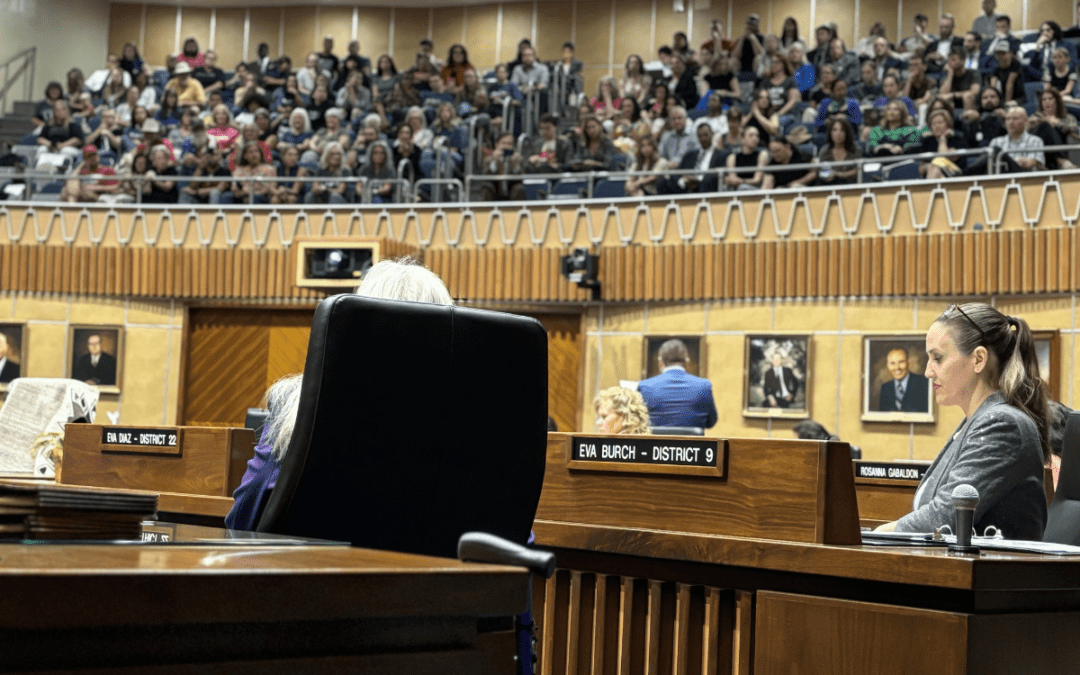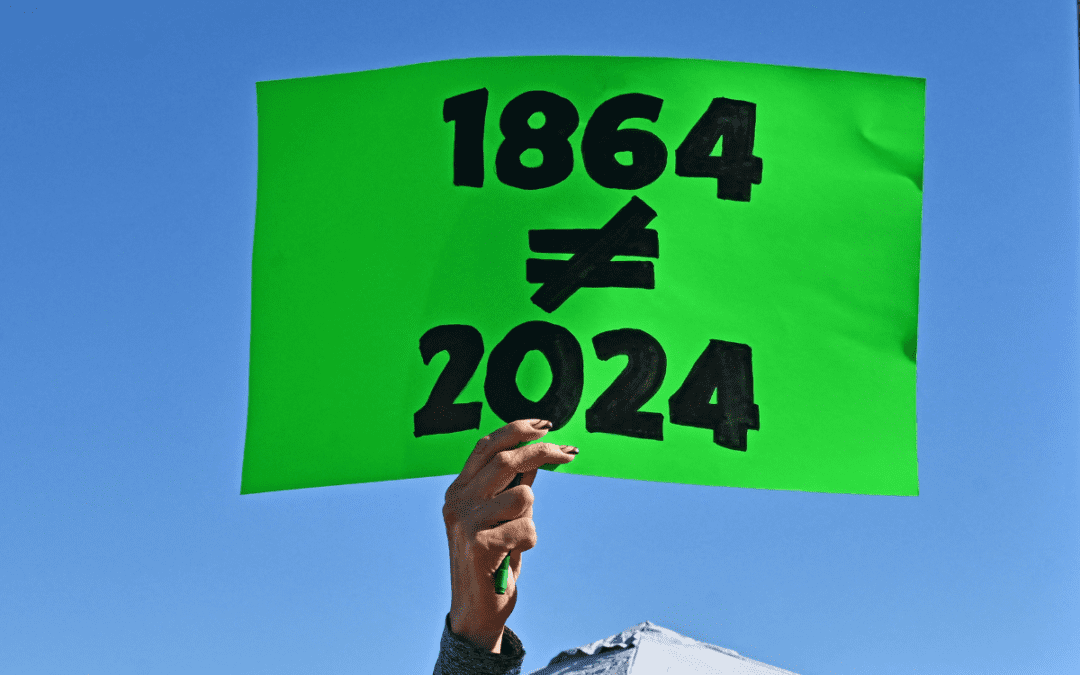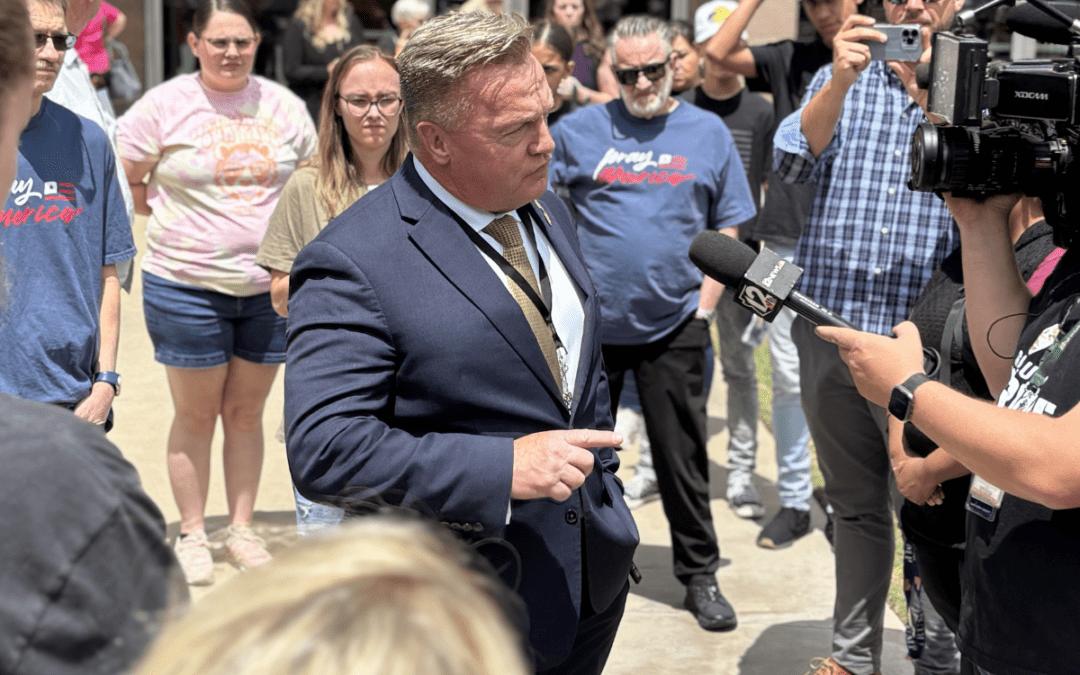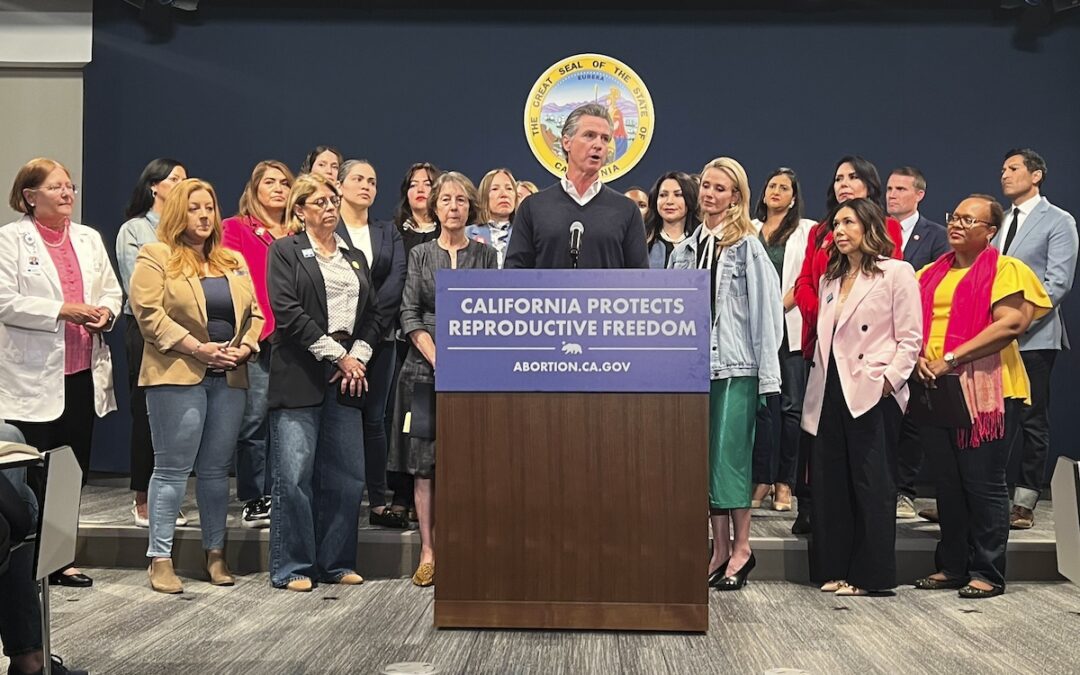
A shopper walks in front of an Albertsons grocery store on February 26, 2024 in Las Vegas, Nevada. On Monday, February 26, the Federal Trade Commission filed a lawsuit in U.S. District Court in Oregon to block Kroger Company’s USD 24.6 billion acquisition of Albertsons Companies Inc., the largest proposed supermarket merger in U.S. history.(Photo by Ethan Miller/Getty Images)
Arizona has stepped in to stop what would be the largest consolidation of grocers in US history—a merger industry insiders have described as a monopoly.
Arizona Attorney General Kris Mayes, the Federal Trade Commission (FTC), and seven other state attorneys general announced a lawsuit against the proposed merger of major grocery chains Kroger and Albertsons on Monday, according to a press release from the AG’s office.
The FTC said in a separate press release that it was suing to block Kroger’s $24.6 billion acquisition of Albertsons because it would “eliminate fierce competition” between two of the largest grocery store chains in the nation, drive up prices, and narrow product choices for consumers. An FTC spokesperson said the office welcomes Arizona’s involvement in the complaint against the grocery giants.
The FTC said in its release that it’s challenging the largest merger of grocery stores in US history, and that executives at both companies know the merger is anticompetitive, quoting one unnamed executive who previously said it was “basically creating a monopoly in grocery.”
Arizonans’ perspectives on the merger
The filing comes after months of debate and evaluation from the FTC and Mayes’ office on the impact the merger would have on prices and job security for grocery store workers, particularly those who live in rural areas of the state.
“In Arizona, Kroger and Albertsons are the 4th and 7th largest private employers, with 35,000 employees across 250 stores combined,” the state attorney general’s office said in the press release.
Last year, Mayes traversed the state to host eight informational meetings, or listening sessions, on the proposed merger that hinged on community feedback. Many Arizonans rebuked the proposed merger, citing potential loss of employment if stores were to be sold to get the merger approved and weaker purchasing power for essential items caused by price hikes.
“Seniors on fixed incomes told me they were worried that grocery prices would only go up if the merger went through,” Mayes said of the listening sessions in the press release. “Military families I spoke to feared their insurance would not be accepted at the pharmacy of a newly merged company. Rural Arizonans, in particular, raised serious concerns about how a merger would exacerbate existing food deserts.”
There are 130 Kroger subsidiaries and 134 Albertsons subsidiaries in Arizona, according to United Food and Commercial Workers (UFCW) Local 99, the largest private sector union in the state that represents more than 20,000 workers at various Fry’s, Safeway, Smith’s, and Albertsons locations. At the union’s international convention in May 2023, UFCW convention delegates voted unanimously to oppose the Kroger-Albertsons merger, saying the companies hadn’t been transparent about the impact the acquisition would have on workers’ jobs.
Catherine Chacon, a UFCW Local 99 union steward and a Safeway employee, said she was excited when she heard Mayes’ office was joining the FTC’s lawsuit. She attended one of the attorney general’s listening sessions last year, where she expressed disapproval of the merger and concerns about job security and price increases.
“I’m hoping for this merger to not go through, and I’m just happy that Kris Mayes went through with it,” Chacon said. She called the grocery chains’ assertion that no stores will close as a result of the merger “lies.”
Cindy Vargas, another UFCW Local 99 union steward and a Fry’s employee, said she’s worried about merger-related store closures impacting the amount of hours she would get at work. Vargas said her weekly schedule is already sporadic, and sometimes she has to travel to other Fry’s locations in order to get to 40 hours. She expressed concern that store closures could push affected employees into her store, and she would subsequently see a time reduction in her schedule.
“We get screwed in the long run,” Vargas said. “I’ve been with Fry’s for 20 years, I don’t think I’d be able to buy a house because I don’t have guaranteed hours.”
How have the companies responded?
In a statement provided to The Copper Courier, Albertsons rebutted the argument the FTC put forward in its lawsuit and highlighted the scope of retailers like Walmart and Amazon in the grocery industry.
“Albertsons Cos. merging with Kroger will expand competition, lower prices, increase associate wages, protect union jobs, and enhance customers’ shopping experience,” said an Albertsons Cos. spokesperson in a statement. “If the Federal Trade Commission is successful in blocking this merger, it would be hurting customers and helping strengthen larger, multi-channel retailers such as Amazon, Walmart and Costco – the very companies the FTC claims to be reining in – by allowing them to continue increasing their growing dominance of the grocery industry.”
The company said that Walmart’s market share alone is approximately double the size of Albertsons and Kroger, citing company filings as of January 2024. In the statement, the Albertsons Cos. spokesperson said the “merger with Kroger will ensure our neighborhood supermarkets can better compete with these mega retailers,” and is planning to challenge the lawsuit in court.
Kroger responded to the announcement of the FTC’s lawsuit by saying that blocking the acquisition would harm American consumers and workers by raising prices. The company said in a press release that it has a “long track record of reducing prices every year” and is committed to devoting hundreds of millions of dollars to price reduction like it’s done with mergers in the past.
The merger was first announced in October 2022 and was expected to be finalized in early 2024. However, the FTC has requested a temporary injunction to block the merger until the lawsuit is concluded. The first hearing in the suit is scheduled for July 31.
Politics

Democrats successfully force vote on repealing 1864 abortion ban, passes House
The Arizona legislature moved forward two bills Wednesday that would repeal the state’s 1864 abortion ban. A bill to repeal the ban has been...

State Official: 1864 abortion ban gives Arizona ‘black eye’
Arizona’s role at the forefront of the climate crisis, defending democratic elections, and protecting reproductive rights has caught the attention...
Local News

Arizona Sens. Anthony Kern, Jake Hoffman, indicted for fake election scheme
Eighteen individuals involved in a conspiracy to overturn Arizona’s election results in 2020 were indicted by a grand jury Wednesday and charged...

Gov. Gavin Newsom wants to let Arizona doctors provide abortions in California
California law generally allows abortion up to the point of fetal viability, which is around 24 weeks. SACRAMENTO, Calif. (AP) — Arizona doctors...




